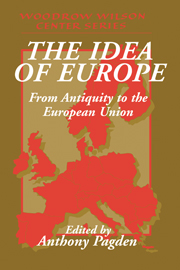Book contents
- Frontmatter
- Contents
- Acknowledgments
- Introduction
- 1 Europe: Conceptualizing a Continent
- 2 Some Europes in Their History
- 3 “Europe” in the Middle Ages
- 4 The Republican Mirror: The Dutch Idea of Europe
- 5 The Napoleonic Empire and the Europe of Nations
- 6 Homo Politicus and Homo Oeconomicus: The European Citizen According to Max Weber
- 7 The European Self: Rethinking an Attitude
- 8 European Nationalism and European Union
- 9 From the Ironies of Identity to the Identities of Irony
- 10 Muslims and European Identity: Can Europe Represent Islam?
- 11 The Long Road to Unity: The Contribution of Law to the Process of European Integration since 1945
- 12 The Euro, Economic Federalism, and the Question of National Sovereignty
- 13 Identity Politics and European Integration: The Case of Germany
- 14 Nationalisms in Spain: The Organization of Convivencia
- 15 The Kantian Idea of Europe: Critical and Cosmopolitan Perspectives
- Contributors
- Index
- Cambridge Cultural Social Studies
6 - Homo Politicus and Homo Oeconomicus: The European Citizen According to Max Weber
Published online by Cambridge University Press: 14 July 2009
- Frontmatter
- Contents
- Acknowledgments
- Introduction
- 1 Europe: Conceptualizing a Continent
- 2 Some Europes in Their History
- 3 “Europe” in the Middle Ages
- 4 The Republican Mirror: The Dutch Idea of Europe
- 5 The Napoleonic Empire and the Europe of Nations
- 6 Homo Politicus and Homo Oeconomicus: The European Citizen According to Max Weber
- 7 The European Self: Rethinking an Attitude
- 8 European Nationalism and European Union
- 9 From the Ironies of Identity to the Identities of Irony
- 10 Muslims and European Identity: Can Europe Represent Islam?
- 11 The Long Road to Unity: The Contribution of Law to the Process of European Integration since 1945
- 12 The Euro, Economic Federalism, and the Question of National Sovereignty
- 13 Identity Politics and European Integration: The Case of Germany
- 14 Nationalisms in Spain: The Organization of Convivencia
- 15 The Kantian Idea of Europe: Critical and Cosmopolitan Perspectives
- Contributors
- Index
- Cambridge Cultural Social Studies
Summary
The monumental though fragmentary work of German sociologist and economist Max Weber (1864–1920) is focused on the quest for the particularity of modern Western civilization. Its vanishing point is the uniqueness of modern “rational capitalism” with its preconditions in, and repercussions on, all aspects of social life. Weber, however, did not develop a theory of the modern world; he embarked rather on its prerequisites in classical antiquity and the middle ages and on crosscultural comparisons with the great civilizations of the Oriental world. That was partly because of his scholarly education; he started his career with works on the interdependence of legal and economic structures in late medieval Italy and ancient Rome. But it was also because of his growing insight that the structural preconditions that enabled the development of a capitalistic culture in the Occidental world and hampered it in the Oriental world could be adequately analyzed only from a point of view of universal history.
The more Weber developed his comparative approach, the more significant became the implications of diverse types of citizenship in the West and the absence of a notion of citizenship in the East. He had already covered certain aspects of this subject in his article “Agrarverhältnisse im Altertum” for the encyclopedia Handwörterbuch der Staatswissen-schaften, which in its final version (1909) became a text of book length.
- Type
- Chapter
- Information
- The Idea of EuropeFrom Antiquity to the European Union, pp. 129 - 138Publisher: Cambridge University PressPrint publication year: 2002
- 1
- Cited by



